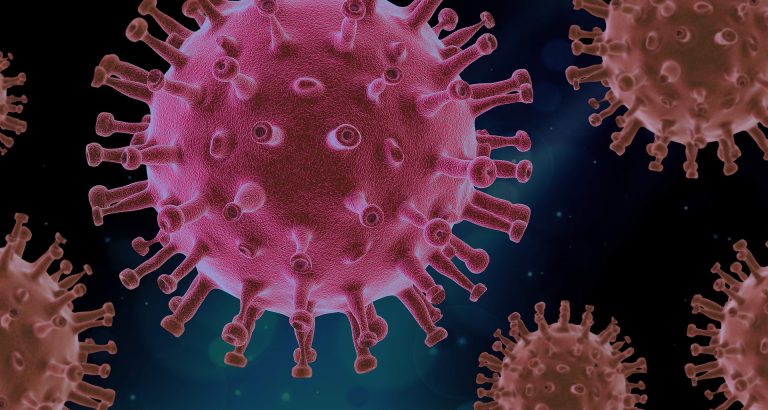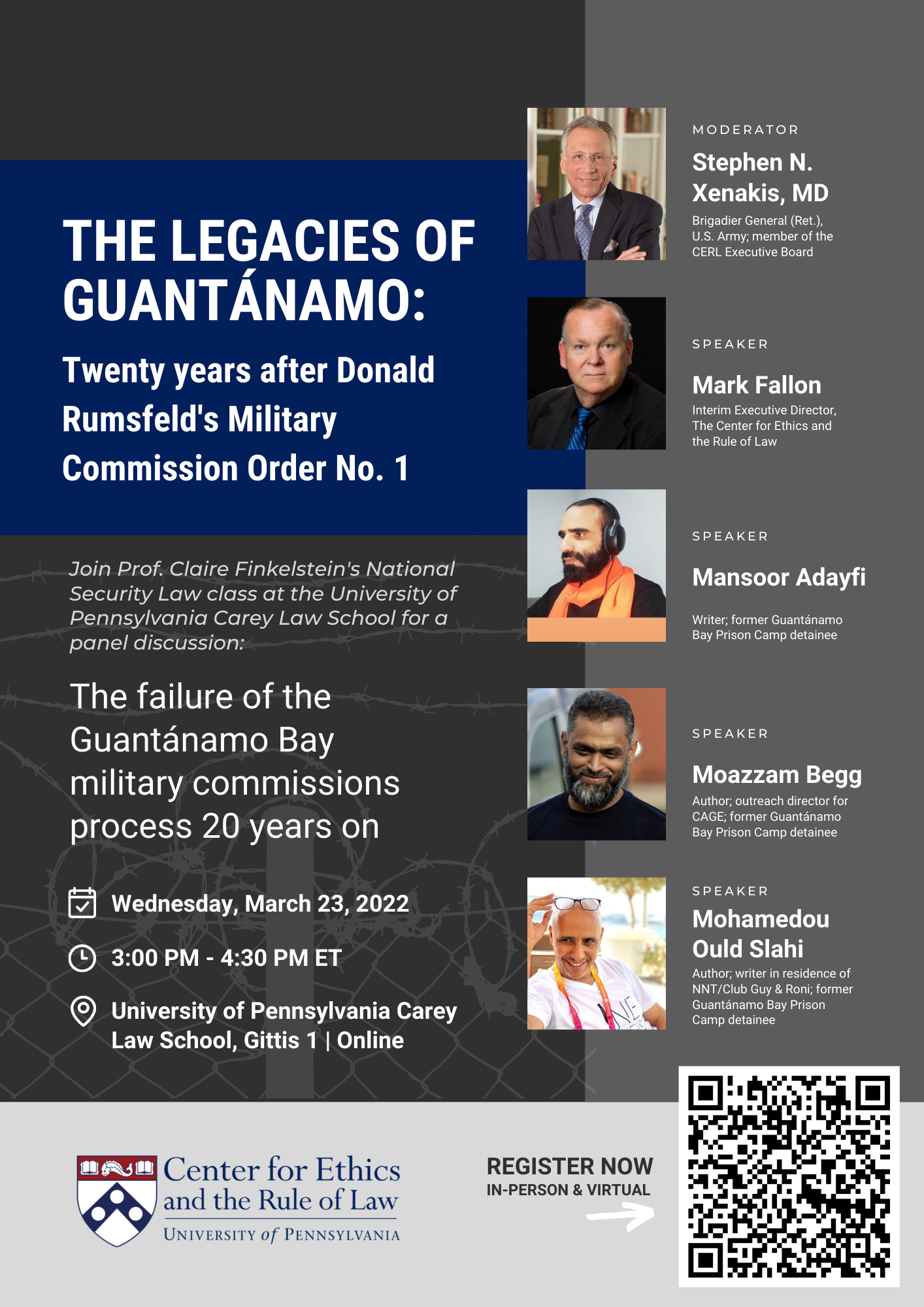
CENTER FOR ETHICS AND THE RULE OF LAW

202 S 36th St, Philadelphia, PA 19104




This program has been approved for a total of 2.0 Ethics CLE credits for Pennsylvania lawyers. CLE credit may be available in other jurisdictions as well. Attendees seeking CLE credit can make a payment via cash or check made payable to “The Trustees of the University of Pennsylvania” on the day of the event in the amount of $80.00 ($40.00 public interest/non-profit attorneys). In order to receive the appropriate amount of credit, evaluation forms must be completed.
Penn Carey Law Alumni receive CLE credits free through The W.P. Carey Foundation’s generous commitment to Lifelong Learning.
According to World Health Organization estimates, COVID-19 has killed nearly seven million people worldwide and over one million people in the United States alone. In May of 2021, President Biden ordered a 90-day intelligence review to determine the origins of SARS-CoV-2, the virus that causes COVID-19. While numerous possible origins were considered, according to declassified public statements issued by the Intelligence Community (IC) Working Group in August of 2021, “the IC remains divided on the most likely origin of COVID-19” and “all agencies assess that two hypotheses are plausible: natural exposure to an infected animal and a laboratory-associated incident.”
The first hearing of the House Select Subcommittee on the Coronavirus Pandemic, held in March of 2023, addressed these hypotheses and underscored the lack of conclusive evidence favoring any one origins theory. While many in the scientific community favor a zoonotic origin, other scientists as well as national security officials believe it came from a laboratory leak. The Department of Energy now joins the Federal Bureau of Intelligence (FBI) in concluding that the virus likely spread from a laboratory-related incident, but with “low confidence” as opposed to the FBI’s “moderate confidence.” Notably, four other agencies favor a natural origin, also with low confidence.
It is possible that the world will never definitively determine how COVID-19 originated. Yet the origins debate has raised many questions of critical importance for U.S. and global national security policy, some of which are under active review by the Biden administration. These questions include what constitutes “gain-of-function” research? What are the costs and benefits of conducting “gain-of-function” research domestically and in partnership with laboratories elsewhere, including in China? As tensions between the United States and China rise, and as the Chinese government resists demands for information that could help settle the puzzle of COVID origins, are there any forms of biological research that the United States should underwrite or conduct with non-democratic nations? If so, what sorts and under what conditions?
The Center for Ethics and the Rule of Law, in partnership with the Annenberg Public Policy Center, will hold a public panel in which scientists, national security professionals, and journalists address the COVID origins debate as well as the broader national security stakes and bioethical implications of gain-of-function research conducted domestically and between the U.S. and Chinese scientific communities. Should the U.S. government fund sensitive biological research like the kind taking place at the Wuhan Institute of Virology? How should the U.S. research enterprise mitigate safety and security risks associated with robust scientific collaboration between actors and institutions in the United States and China? How can the United States better guarantee the safety of this research?
Katherine Eban, an investigative journalist, is a Vanity Fair contributing editor and Andrew Carnegie fellow. Her reporting on generic drug fraud, gun trafficking, coercive CIA interrogations and COVID-19’s origins has won international attention and numerous awards, including from the National Association of Science Writers, the Overseas Press Club, Investigative Reporters & Editors and Newswomen’s Club of New York. Her 2019 book, Bottle of Lies: The Inside Story of the Generic Drug Boom, was a New York Times bestseller. A Rhodes Scholar educated at Brown and Oxford Universities, she lives in New York with her husband, two daughters and Newfoundland dog Romeo. Twitter: @KatherineEban
Dr. Gronvall is an Associate Professor in the Department of Environmental Health and Engineering at the Johns Hopkins Bloomberg School of Public Health and a Senior Scholar at the Johns Hopkins Center for Health Security. She is an immunologist by training. During the COVID-19 pandemic, she has led the Center’s ongoing efforts to track the development and marketing of molecular and antigen tests and serology tests, as well as the development of national strategies for COVID-19 serology (antibody) tests and SARS-CoV-2 serosurveys in the United States. She also has written about the scientific response to the COVID-19 pandemic, the contested origin of SARS-CoV-2, and the implications for national and international security. Dr. Gronvall is a member of the International Security Advisory Board, which provides advice to the Under Secretary for Arms Control and International Security at the Department of State and a life member of the Council on Foreign Relations. Twitter: @ggronvall
Jamie Metzl is Founder and Chair of the global social movement, OneShared.World, a Senior Fellow of the Atlantic Council, a faculty member of Singularity University and NextMed Health, and the author of five books, including the recent bestseller, Hacking Darwin: Genetic Engineering and the Future of Humanity, which has been translated into 15 languages. His next book, The Great Biohack: Recasting Life in an age of Revolutionary Technology, will be published by Hachette in May 2024. In 2019, Jamie was appointed to the World Health Organization expert advisory committee on human genome editing. Called “the original COVID-19 whistleblower” for his leading role raising the possibility of a research-related pandemic origin and advocating for a full investigation, his work has been featured in 60 Minutes, the New York Times, and most major media across the globe. He was the lead witness in the first congressional hearings on this topic in March 2023. Jamie previously served in the U.S. National Security Council, State Department, and Senate Foreign Relations Committee and with the United Nations in Cambodia and appears regularly on national and international media. He holds a Ph.D. from Oxford, a law degree from Harvard, and an undergraduate degree from Brown. Twitter: @JamieMetzl
Dr. Sergei Pond is Professor of Biology at the Institute for Genomics and Evolutionary Medicine of Temple University. Modern biology is unimaginable without sequence analysis, and sequence analysis is impossible without bioinformatics tools and statistical methods. Over the past twenty years, his group has developed and applied both, almost always with a large number of interdisciplinary collaborators, to the study of various systems, especially viral pathogens (HIV-1, Influenza A virus, Ebola virus, etc.). Their research is not limited to any particular system, any particular set of evolutionary questions, or any particular methodological or computational approach: rather they try to identify and implement a practically useful, and statistically justifiable solution to a particular problem. They focus on delivering high quality, computationally efficient and user friendly scientific software. Twitter: @sergeilkp
Susan Weiss obtained her Ph.D. in Microbiology from Harvard University working on paramyxoviruses and did postdoctoral training in retroviruses at University of California, San Francisco. She came to Penn as an Assistant Professor in 1980, and is currently Professor and Vice Chair, Department of Microbiology, and Co-director of the Penn Center for Research on Coronaviruses and Other Emerging Pathogens at the Perelman School of Medicine at the University of Pennsylvania. She previously served as Associate Dean for Biomedical Postdoc Programs (2010-2019). She has worked on many aspects of coronavirus replication and pathogenesis over the last forty years, making contributions to understanding the basic biology as well as organ tropism and virulence. This work included the murine coronavirus (MHV) infection of the central nervous system disease, a mouse model of multiple sclerosis. More recently she has work on MERS-CoV and since 2020 also on SARS-CoV-2. Her work for the last ten years has focused on coronavirus interaction with the host innate immune response and viral innate antagonists of double-stranded RNA induced antiviral pathways. Her other research interests include activation and antagonism of the antiviral oligoadenylate-ribonuclease L (OAS-RNase L) pathway, flavivirus- primarily Zika- virus-host interactions and pathogenic effects of host endogenous dsRNA. Twitter: @weisssr
Claire Finkelstein is the Algernon Biddle Professor of Law and Professor of Philosophy at the University of Pennsylvania and a distinguished research fellow at the Annenberg Public Policy Center (APPC) as well as a senior fellow at the Foreign Policy Research Institute (FPRI). She is the Founder and Faculty Director of Penn’s Center for Ethics and the Rule of Law. An expert in the law of armed conflict, military ethics, and national security law, she is a co-editor (with Jens David Ohlin) of The Oxford Series in Ethics, National Security, and the Rule of Law and a well-published author in the areas of national security and democratic governance. Professor Finkelstein is a frequent radio, broadcast, and print commentator. Twitter: @COFinkelstein
All Rights Reserved © 2025